We use cookies to ensure you get the best browsing experience. By continued use, you agree to our privacy policy and accept our use of such cookies. For further information, click FIND OUT MORE.
In the depths of darkness and despair, a group of Filipino caregivers emerged as beacons of hope and resilience. Their survival against the orchestrated onslaught unleashed by Hamas in the deadly October 7 attacks is a testament to the strength of the human spirit.
Through the confines of technology, I had the honor of connecting with some of these caregivers via Zoom or Face-time. However, it was during my visit to Israel, on a mission to cover the Israel-Hamas war for GMA Integrated News, that I truly glimpsed their unwavering determination.
They stared death in the face and lived to tell the tale.
But beyond their unimaginable ordeal, what truly struck me was the profound significance of their stories. These narratives are a powerful reflection of the unique Filipino trait known as "Malasakit" – an unfathomable depth of care and compassion, selflessly bestowed upon others, without any expectation of reciprocation.
Delve into the heart-wrenching stories of these Filipino caregivers and explore how they escaped the clutches of death amid the devastating Hamas attack in Kibbutz Southerners, Israel.
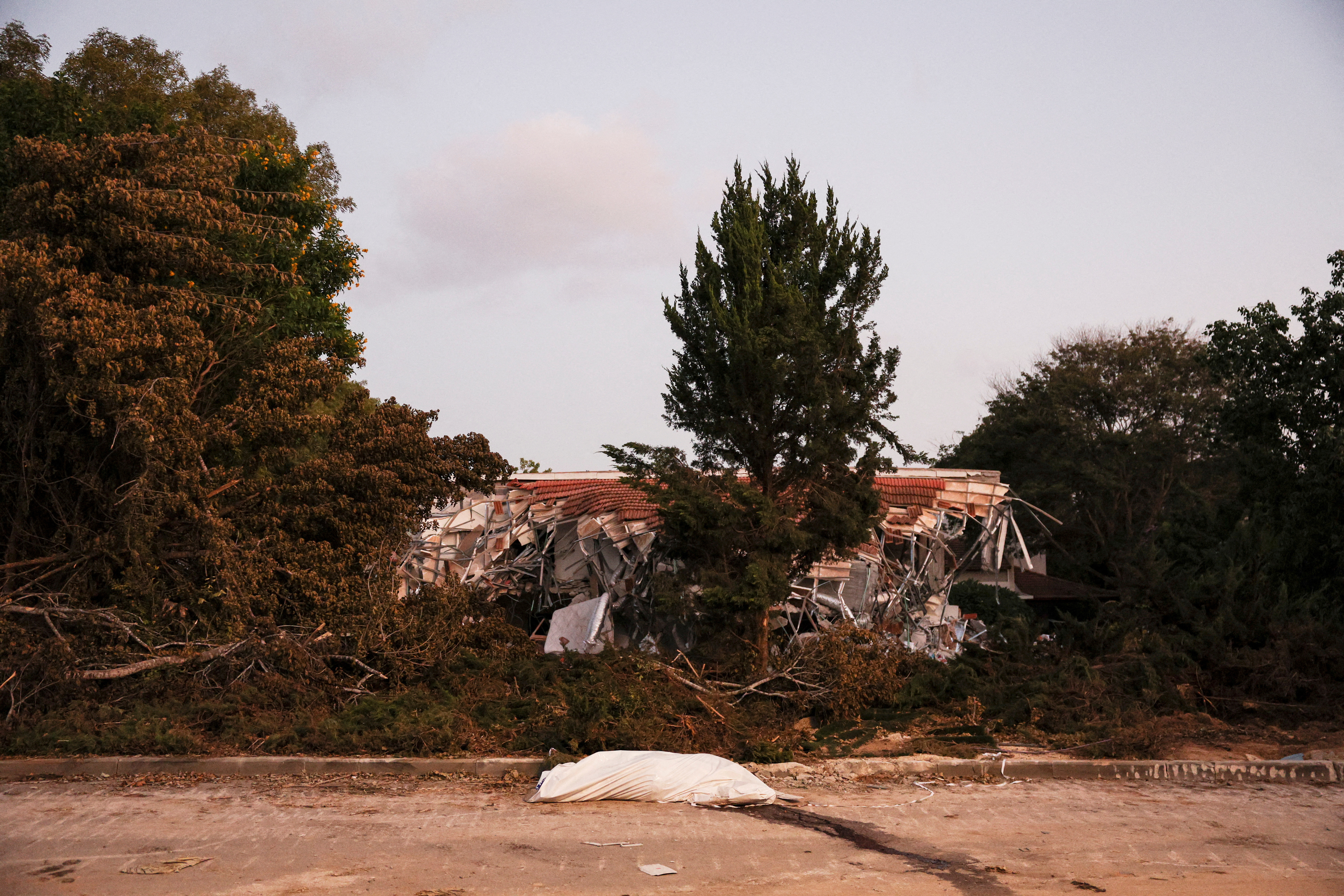
A dead body lies on the ground following a mass infiltration by Hamas gunmen from the Gaza Strip, in Kibbutz Beeri in southern Israel, October 11, 2023. REUTERS/Violeta Santos Moura
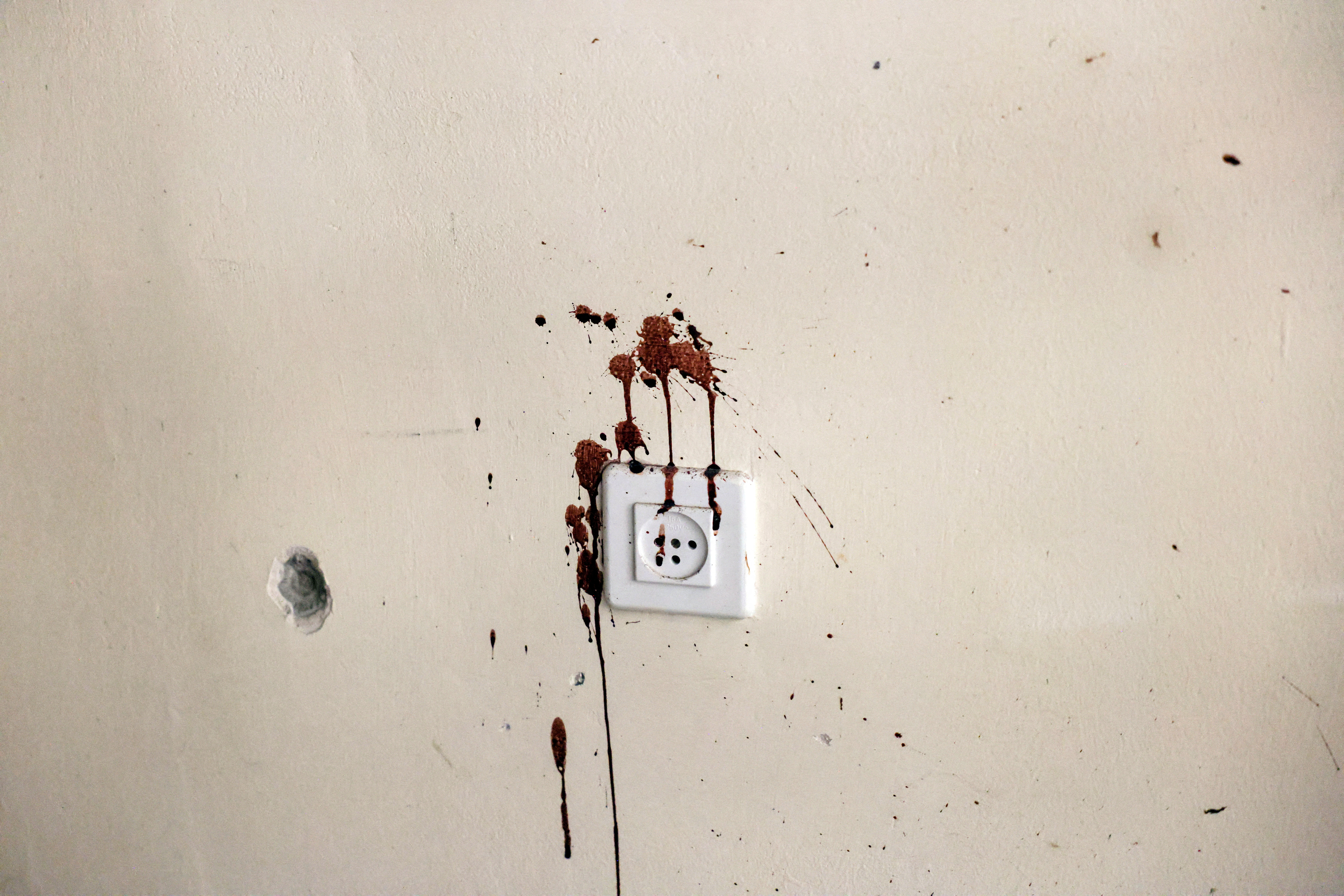
Dried blood is seen splattered on a wall, following a deadly infiltration by Hamas gunmen from the Gaza Strip, in Kibbutz Beeri in southern Israel October 17, 2023. REUTERS/Ronen Zvulun
Mariza, Rubylyn and Sally
Nervous Filipino caregivers Riezl, Sally Rubylyn, and Mariza shared their harrowing experience in an interview with GMA Integrated News, detailing the violence they witnessed early Saturday morning in Kibbutz Nahal Oz, which is located near the border of Gaza where the Hamas group originated.
When the sirens sounded due to the threat of air strikes, Mariza and her elderly Israeli grandmother sought refuge in the bomb shelter, known as "Mammad" in Hebrew. However, Mariza left her Israeli national grandfather in the common area of the housing facility in Kibbutz Nahal, thinking they were accustomed to the threat of air strikes.
Little did they know, the Hamas group had already infiltrated the border that separates Gaza Strip and Kibbutz Nahal Oz, which is part of Israel.
The next events were shocking.
"I saw my grandfather, getting shot in the living room. I saw it through the door because I was standing there watching TV. Suddenly, gunfire erupted in the living room, and I saw my grandfather sitting there. Bullets rained down on him. He even stood up, but then he fell," Mariza said with sadness in her voice.
Although she wanted to bring her employer's pet with her, Mariza had to save herself and her elderly employer.
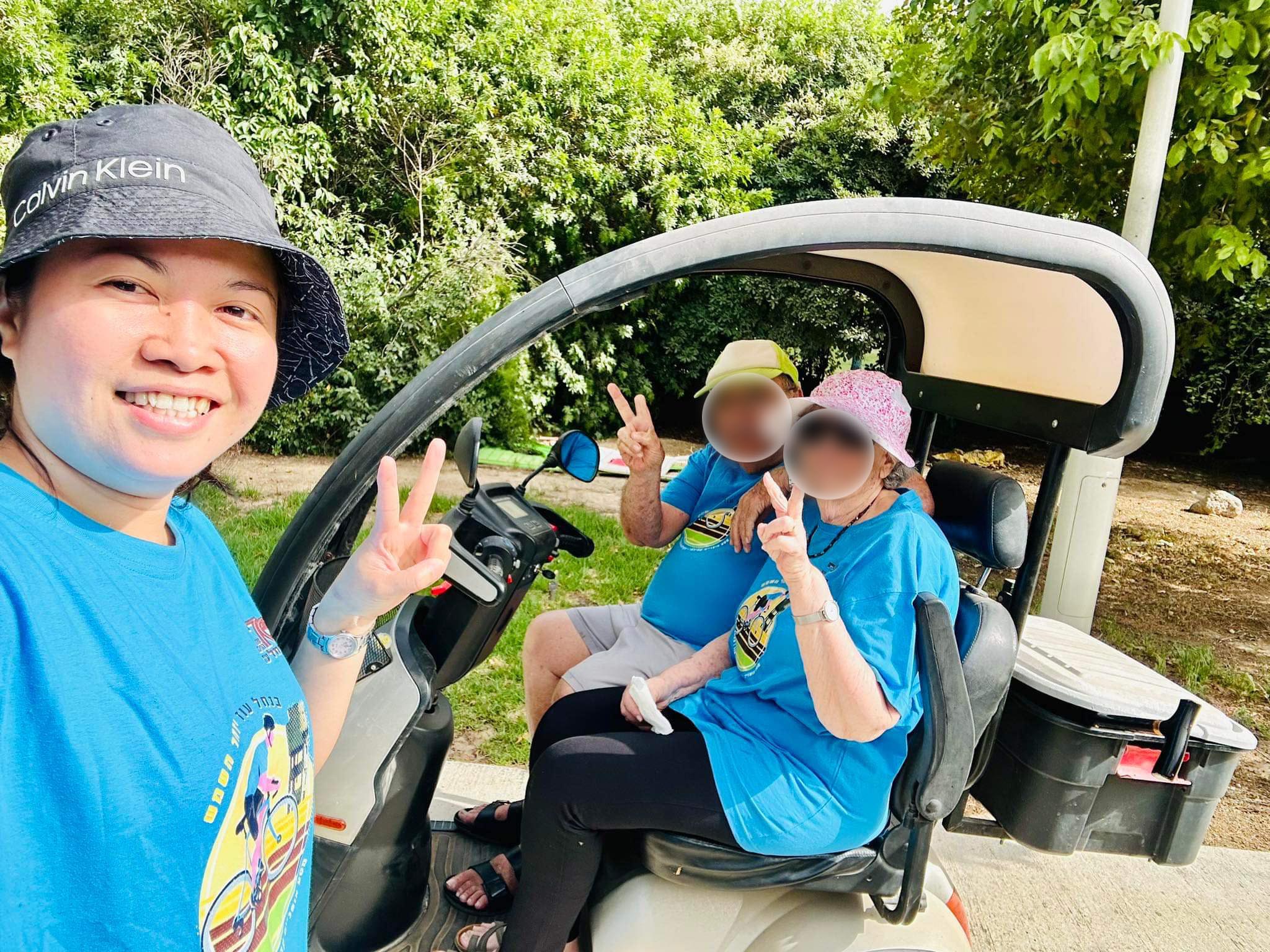
Mariza with her elderly care. Photo courtesy of Mariza.
Mariza recounted, "I was really alert, and I didn't know how I managed to close the door of the bomb shelter. It was very difficult to close. I didn't know where my strength came from, but my grandmother and I stayed inside. We held each other tightly. I thought they would let us in the bomb shelter... I thought it was the end for us, but thank God, he heard our prayers."
While Mariza and her employer were inside the bomb shelter, other Filipino caregivers working in Kibbutz Nahal, like Rubylyn, were also hiding in their respective bomb shelters.
Rubylyn said, "You can literally see Gaza, it's just a borderline with barbed wire. We can see it even on ordinary days, and we can hear what's happening in Gaza now. If there's a warning, we are the first ones our kibbutz head informs that there will be a bomb coming."
But it wasn't just bombs that arrived; it was the actual members of Hamas coming from Gaza who had infiltrated the controlled area of Kibbutz Nahal. The Filipino caregivers hid for several hours.
Until there was a knock on their doors from someone who identified himself as an Israeli soldier, urging them to leave and promising their safety. But...
"Since we weren't sure and there was no announcement in our group chat, especially from our kibbutz, no matter what they did, we didn't respond. We didn't open the door because it was the safest thing we could do," said Sally Macaroni, another Filipino caregiver in the same Kibbutz.
However, the Israeli soldiers did not leave the Filipinos and their charges behind. They persisted in convincing them to come with them to a safe place.
"They didn't stop knocking on our doors, asking 'Kol b'seder?' (Are you fine?) They said, 'Are you okay?' We just replied, 'Okay.' But until we opened the door with my grandmother... when we opened it, there they were, the soldiers," said Rubylyn.
The housing facility where the Filipino caregivers resided and worked was inspected by the IDF or Israel Defense Forces, searching for any remaining or hidden Hamas forces.
Once everything was clear, the group of Filipino caregivers was transported in a military vehicle along with their Israeli charges and their families.
During the journey, the OFWs, together with the IDF and some Israelis, captured footage of some facilities along the Gaza border engulfed in flames.
After hours of travel, the Filipino caregivers arrived at the northern part of Israel, in the midst of Mishmar HaEmek.
At the shelter, Mariza’s group saw Israeli children, grandchildren of their wards, peacefully sleeping, worn out from their day.
But Mariza's group, filled with worry and concern, could not find rest. They discussed what happened to their loved ones and acquaintances, who they have heard went missing or got caught in the turmoil between Hamas and Israel forces.
Irene Repuela Torres and Rebecca Sábado
Just Like Mariza, Filipino caregiver Irene also found refuge inside their Kibbutz bomb shelter and hid for hours.
While inside a bomb shelter or "mammad," as it is called, Irene and her elderly Israeli employer sought safety as Hamas attacked their employer's house in Kibbutz Kissufim, located right beside the Gaza border.
Irene recalls the moment, "That was the time when I locked the 'mammad,' and they started shooting. Thankfully, the safe was really locked and they couldn't open it."
For thirty-five hours, they were trapped inside their bomb shelter.
They survived by drinking a bottle of water provided by their Israeli employer, and during that time, the only thing Irene could do was pray. "I prayed that we would be safe, that they wouldn't come in again. We were tired and hungry, and I worried about my elderly charges, how would they manage?"
At the time, Irene was sending messages of farewell to her family in the Philippines... "I already messaged my family, telling them that our house had been invaded. I couldn't help but think, what if they took me hostage? It truly crossed my mind."
When she finally exited the building, she saw bullet holes right in front of the bomb shelter or "mammad" door.
She witnessed how the bullets destroyed their ceiling and tore the entire house apart.
When she sought help from the Philippine Embassy in Israel, they immediately coordinated with the Israel Defense Force or IDF.

Irene with the IDF soldier who rescued her, in a photo taken weeks after. Photo courtesy of Irene.
It was then that Irene discovered she was among those reported missing. While crying, she shared during our interview, "So around 3 p.m., I was finally rescued. It turned out that I was the only one left on the bus with my elderly charge, while everyone else was already safe."
Irene is one of more than twenty Filipino caregivers who were first reported missing in Israel after the Hamas attack.
Another Filipina caregiver in the same Kibbutz, Rebecca, not only had their house shot at but it was also set on fire. She saw Hamas members outside their house.
Rebecca recalls the horrific scene she witnessed as she was fearfully trying to escape their burning kibbutz, "I saw the living room already on fire, so I ran out and asked for help. But I saw a Hamas member there, thankfully he didn't shoot at me."
She added, "I spent thirty minutes asking for help at our neighbor's house, only realizing later that our neighbor had already been shot and killed."
Joey Pagsolingan
Joey Pagsolingan, a Filipino caregiver working in Kibbutz Be'eri, bravely shared his harrowing experience during a recent Hamas attack. He recalled spending around 15 terrifying hours in his employer's bomb shelter, seeking refuge from the violence. Despite sustaining gunshot wounds, Joey managed to escape and is now seeking therapy and treatment.
In the middle of the chaos, Joey anxiously waited for Hamas to leave, but their presence continued to loom uncertainly. For almost 15 hours, he remained huddled inside the bomb shelter, praying and desperately pleading for help using his cellphone.
Suddenly, the smell of smoke filled the air as Joey cautiously emerged from the shelter, only to be met with a horrifying realization. Their home was ablaze, consumed in flames by the ruthless actions of Hamas.
Recalling the shocking moments, Joey, the sole survivor among the Filipino caregivers, described how the Hamas militants swiftly infiltrated their Kibbutz. "They were already inside our house, there were so many of them. I was the only one armed. The door downstairs had no lock. What I did was go to my ward, urging her repeatedly to come with me, but she refused," Pagsolingan shared.
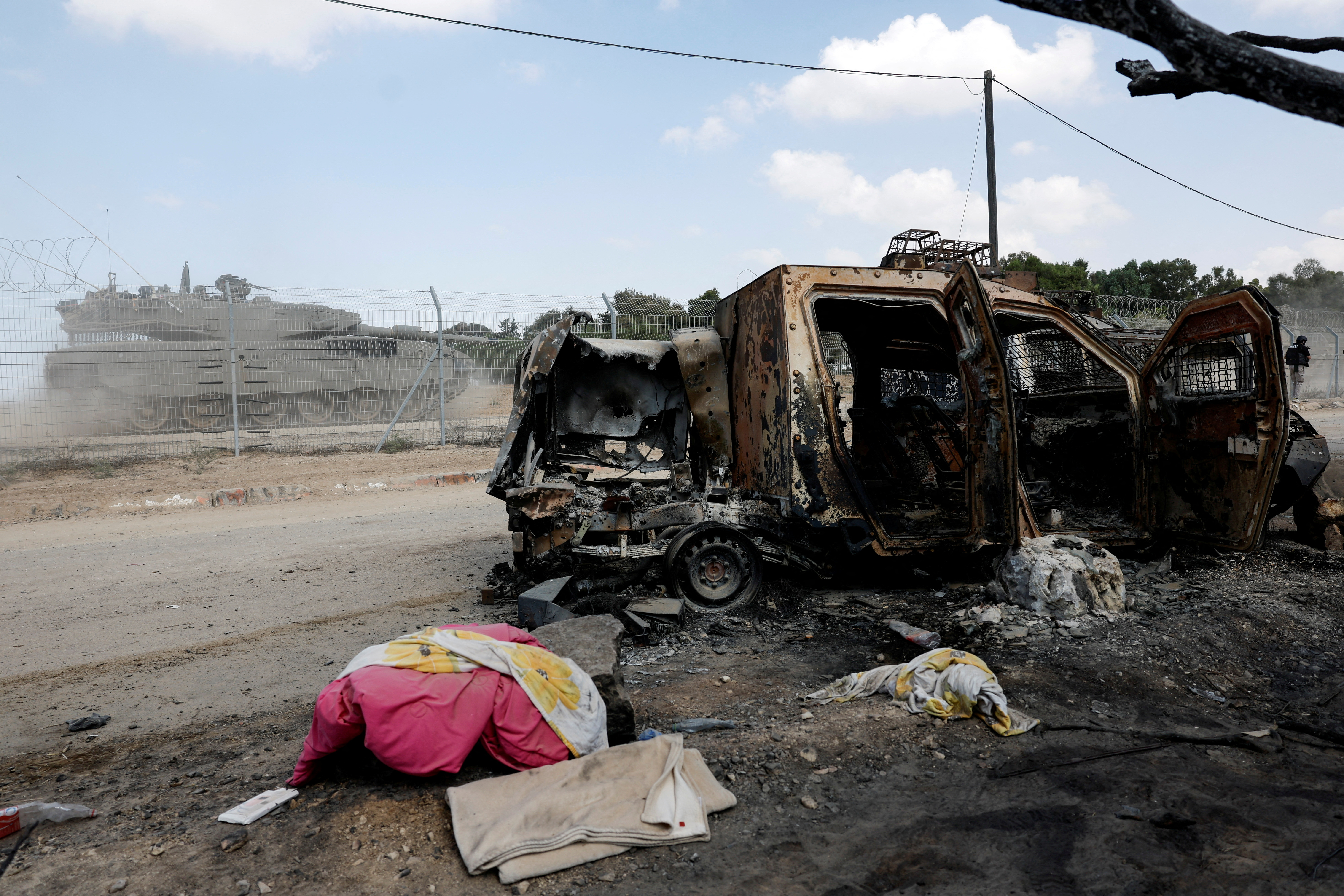
A burnt armored vehicle is abandoned, following a mass infiltration by Hamas gunmen from the Gaza Strip, in Kibbutz Beeri in southern Israel, October 13, 2023. REUTERS/Amir Cohen
Amid the chaos, the OFW caregiver disclosed that the Hamas group attempted to breach the bomb shelter, claiming to be the Israeli Defense Forces. However, Joey's skepticism led to the door being riddled with bullets, causing severe injuries from gunshots.
Before being engulfed in smoke, Joey remembered another knock on the bomb shelter door. This time, the individuals identified themselves as the Israeli Defense Forces, but his doubts prevailed, leading him not to open the door.
In response, the soldiers fired their guns at the door, causing the bullets to penetrate and hit his left arm bone.
Bleeding profusely and in extreme pain, Joey said, "My hand was covered in blood, and I screamed. I was thrown off balance. If you saw it, there was blood everywhere. They provided first aid for me inside the house."
Heartbreakingly, Joey also recalled seeing the lifeless body of his employer when he was rescued. "My employer was there, sitting on a plastic chair in our backyard. Dead. It's truly a miracle that I am alive today. For those who don't believe in miracles, I am [a] living proof," he added, his voice trembling with emotion.
While the Israeli Defense Forces escorted Joey to safety, there were still exchanges of gunfire, as it turned out that some Hamas militants had hidden in their own homes.
Along the way to the ambulance, Joey was devastated upon seeing his Israeli employer, now dead. Tearfully, he expressed, "He was lying there, wrapped up, lifeless. It's an indescribable pain to realize that my employer, killed by Hamas, is gone."
Camille Jesalva
In the Holy Land of Jerusalem, we met Camille, a Filipino caregiver in Israel, and her 95-year-old Israeli ward named Nitza.
In the beautiful and peaceful Nofim home for seniors, the Israeli government transferred Nitza and Camille after they escaped the attack by Hamas on their home in Kibbutz Nirim on the morning of October 7.
During their five years of living in Kibbutz Nirim, Camille and Nitza never felt anxious or worried about Israel's enemy, Hamas, who was just next to them in Gaza.
That's why the Hamas invasion on their kibbutz on October 7 was considered the darkest and scariest phase of Camille's life.
It all began when she saw armed men circling around the vicinity of Kibbutz Nirim. Shortly after, Hamas started setting fire to the surroundings.
Camille captured the smoke from the burning Hamas through a video from the window of their room.
Recalling the incident, Camille said: "At the back of our house, there was a fire. I didn't know that the terrorists were burning the cars in the parking lot, as if they were just hidden behind the trees. I think that's where they spotted me."
The burning of the cars outside Nitza and Camille's house coincided with the missile warnings, so Camille immediately brought Nitza to the bomb shelter inside their house.
Although the door of the bomb shelter was shut, Camille discovered that the lock was broken from inside.
"They entered from the main door. They grabbed a big rock and smashed it against the main door," Camille described. "They were causing chaos, speaking in Arabic, disturbing the house. I don't know what they were looking for, and the shelter was just beside them. I was trembling."
Camille knew that Hamas was going to infiltrate the bomb shelter and prepared herself for it.
She sent a message to her mother in the Philippines, requesting her to make a video message of their only son. Camille pleaded, "Please send a picture of my son. If I can't survive, I want to see my son before I close my eyes and die with him."
Fortunately, Nitza was sleeping during those moments while hiding in the bomb shelter.
According to Camille, multiple groups of Hamas came in and out of their house but never looked into the bomb shelter.
Until one Hamas man entered the bomb shelter where Camille and Nitza were hiding.
Camille knew that her ward would wake up and surely scold the armed Hamas member.
"I need to be strong. I lost my fear and said, 'Hello sir, shalom adoni.' Then he said, 'Efokesep?' ('Where's the money? Where's the phone?')" Camille recalled. "Nitza was still asleep. He faced me, and I gestured with my hands, 'Please be quiet.' Luckily, he understood that I was scared. Then she confronted me, saying, 'Camille, why didn't you close the door?'"
She added, "The man had an angry face. I approached him with my palms open, saying 'Adoni islikabe bakasha' ('Sir, please, I'm so sorry. She's old. She doesn't know what she's doing. Please be patient.'). Then he calmed down."
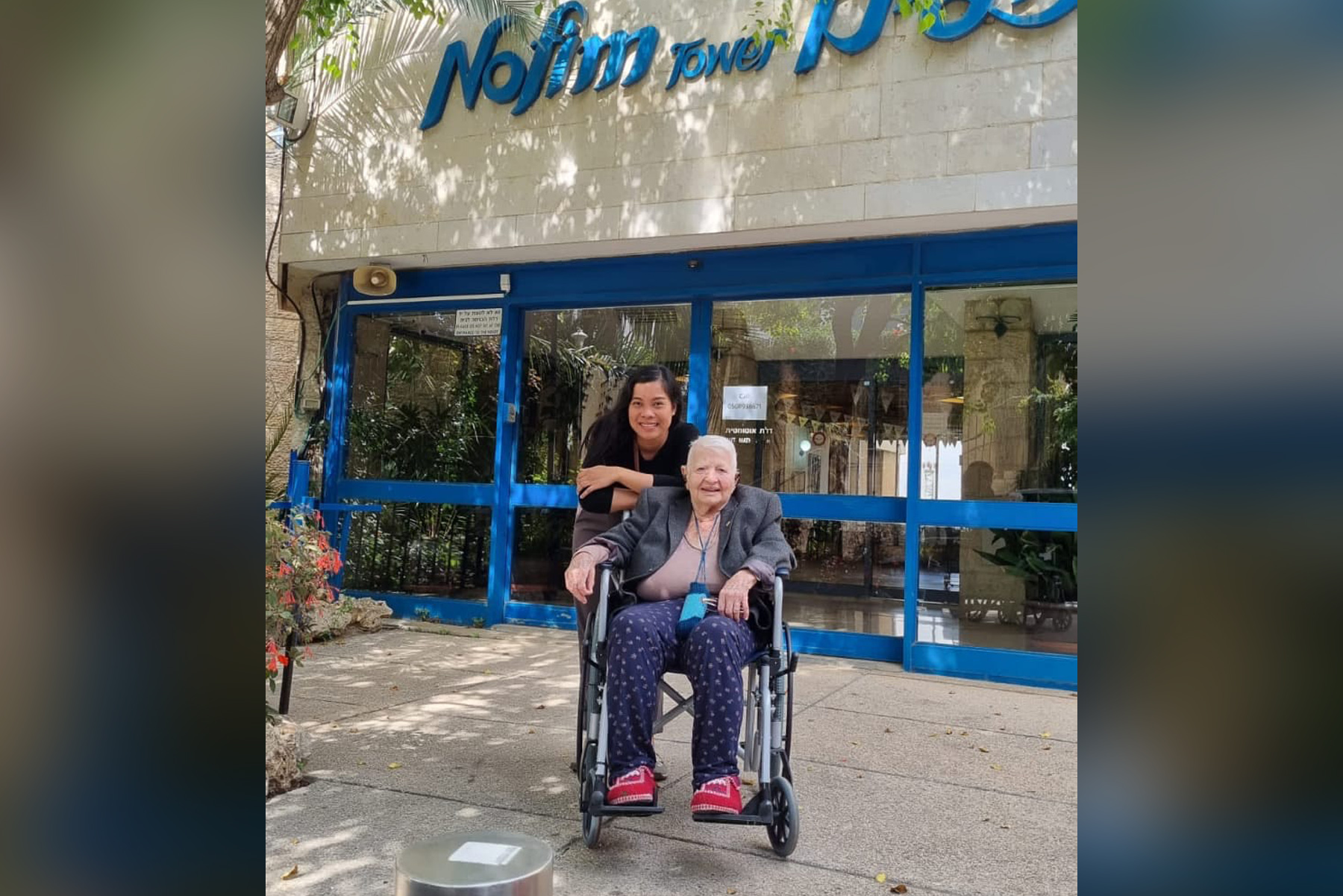
Camille with her ward. Photo courtesy of Camille.
When the Hamas member, who was angered by Nitza's speaking, calmed down, he took Camille's cellphone and she immediately offered the remaining money she had saved to send to her family in Nueva Ecija.
Camille shared the harrowing account of the incident, her voice trembling with emotion. She said, "I took out my wallet and opened it. That's when I saw his face and I thought to myself, 'Kesef adoni, kesef eze!' I grabbed my wallet and placed it in his hand, saying, 'Zek alak adoni.' Suddenly, my passport flashed before my eyes. I said, 'Sai ko,' in Hebrew, which means 'not my cards.' I needed my passport."
She continued, recounting how Hamas searched for money and rummaged through their belongings, but when they found nothing, they left the neighborhood and their house.
"Ang sagarti etodara ba Adoni, ansagarte," Camille said, her eyes welling up with tears. "That means, 'Thank you so much, sir. I will close the door now.' Then he nodded and turned around. That's when I ran to Nitza, that's where I had my breakdown."
Camille shared that they waited for several hours inside their bomb shelter before help arrived from the Israel Defense Force. As they made their way out of the house, she said she heard continuous gunfire between Hamas and the IDF.
"Ang daming barilan, ang daming rockets sa paligid namin. Natumba kami, nadapa kami pero we were safe. I feel na yung Diyos may guide sa amin. Dalawa may nag-guide sa amin na kakaiba. Yun ang naisip ko. Hindi ko talaga akalain na mabubuhay pa ako," Camille said, tears streaming down her face. "I feel so blessed... And now everything is going in God's will. We are sleeping and when we wake up, we're in the terror in the darkness. And then we came here, sa Holy Land Jerusalem. I feel so blessed," she added, crying uncontrollably.
[There were lots of gunfire, rockets. We fell but we were safe. I felt that God guided us. There were two people who guided us ... I really thought I wouldn't make it.]
Camille had planned to return to the Philippines last October 9 to visit her child. However, due to Nitza's current health condition, she made the decision not to leave her side.
Already overwhelmed with emotions, Camille held Nitza's face in her hands and told GMA Integrated News, "I have promised to her that I won't leave you in all my life. You are the only one who accepts me for who I am. That's how we talk to each other. And I love you so much, and I will never leave you until you die. And if you die, I will go home, and I will not get another boss. Those are my words to her. So, thank you God, talagang naligtas kami [we are now safe]," she said, her voice filled with gratitude and tears.
Monica
Monica, another Filipino caregiver, had a chilling encounter with the armed Hamas group that infiltrated her Kibbutz. While others remained unaware, Monica witnessed their arrival through the CCTV cameras and monitors installed inside the bomb shelters where she was caring for her elderly Israeli charge.
In the midst of the first wave of Hamas attacks in southern Israel, Monica and her fellow caregivers received news of the invasion through their group chat. She shared the haunting message, "Nandito na sila, nandito na sila" (They're here, They're here).
Through the CCTV footage, Monica saw a Hamas militant dressed in a red T-shirt and a vest with a high-caliber rifle. The sound emanating from this Hamas member hiding nearby their bomb shelter sent shivers down her spine. Monica recollects, "He was shouting 'Jihad, Jihad,' 'Allahu Akbar' repeatedly. That was the moment I thought it might be my end."
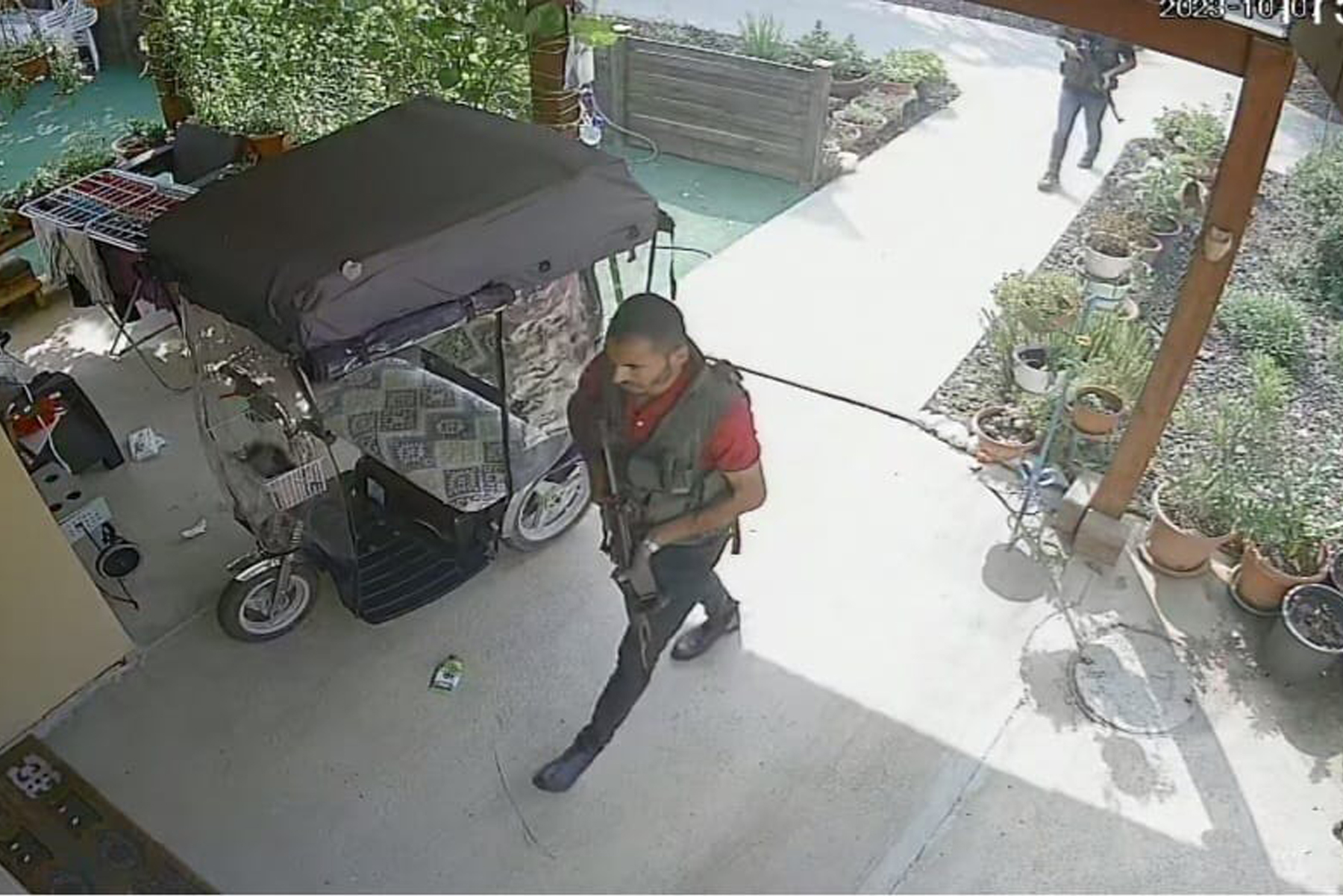
A Hamas member as seen from the CCTV footage from the bomb shelter. Photo courtesy of Monica.
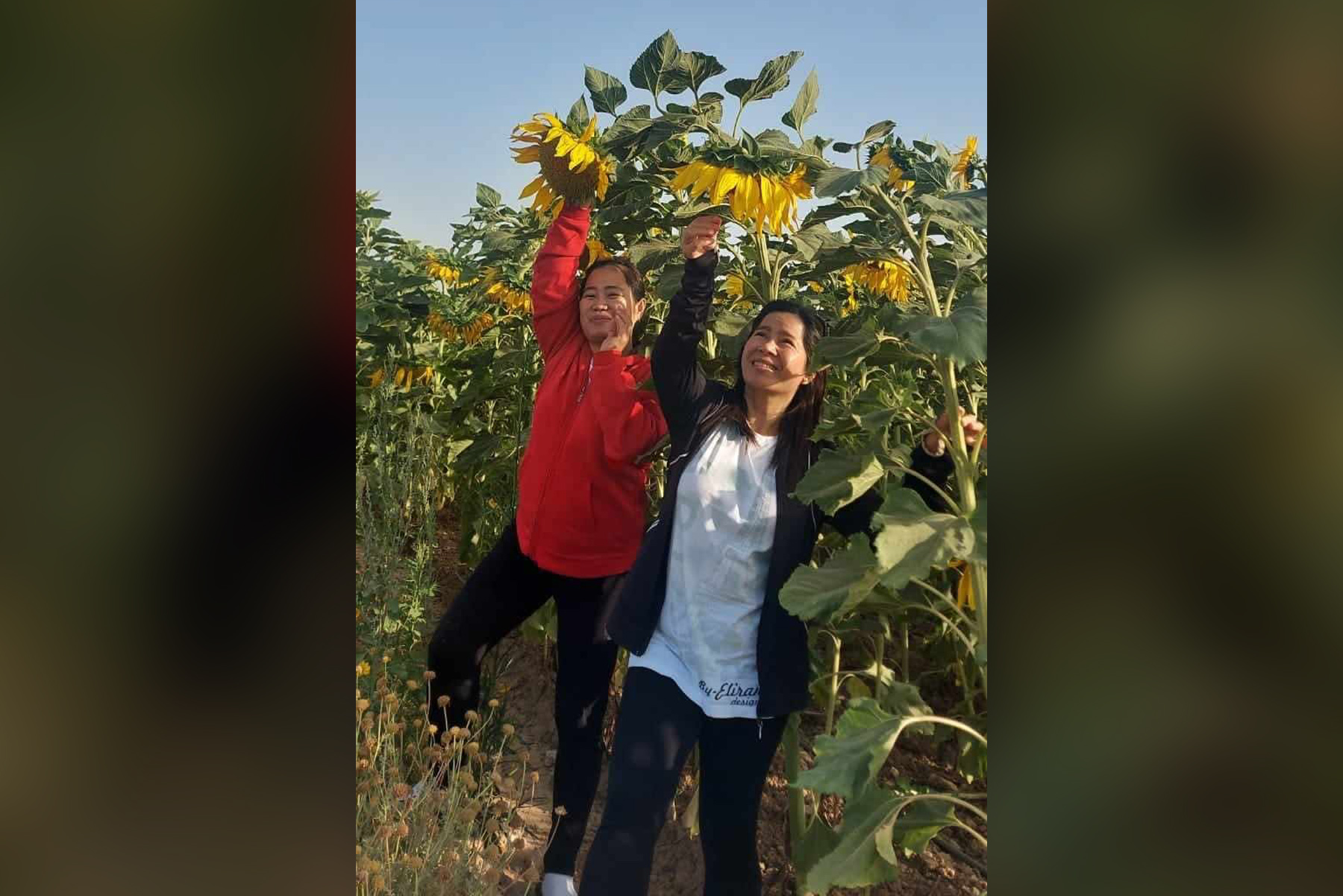
Monica with her fellow Filipino caregiver Grace, one of those who died in the October 7 attack. Photo courtesy of Monica.
Soon, several more Hamas members arrived on bicycles, likely commandeered from nearby houses in the Kibbutz. Monica, desperate to calm her Israeli charge, unwittingly alerted the Hamas militants to their hiding place. She prayed fervently, hoping that they would not discover them. "They tried multiple times," Monica revealed, "and that was the moment I cried out to God, begging for protection. My employer was also praying, and my elderly care recipient was coughing, making it even more nerve-wracking."
Despite numerous attempts to breach their fortified bomb shelter, the sturdy metal walls and bulletproof window of their shelter held strong. Monica maintained a firm grip on the door handle throughout the ordeal. Eventually, Monica saw on CCTV that some of the Hamas militants had left their premises.
However, she soon realized that they had set their home ablaze. She recalls, "When our house was set on fire, the intense heat and smoke engulfed everything. Fortunately, our main bomb shelter was fireproof, but the smoke and heat infiltrated the room, resembling an oven."
Monica did everything she could to prevent her Israeli charge from inhaling the smoke. It took hours before the Israeli Defense Force arrived, miraculously saving Monica and her charge. As she was being transported away in an IDF military vehicle, she managed to capture a quick snapshot of their burning house.
Currently, Monica is undergoing psychiatric and psychological treatment along with other overseas Filipino workers (OFWs) who witnessed and miraculously survived the Hamas massacre in the Kibbutz. Although her parents and children have longed for her return, Monica has decided to stay and complete her treatment, unable to abandon her Israeli charge. Tearfully, she shared, "I can't leave her behind. It would hurt me to think that I saved her only to leave her here."
Like Monica, many OFWs in Israel, including survivors of the Hamas attack, choose to delay their return to the Philippines until they are certain about the well-being of their Israeli charges.
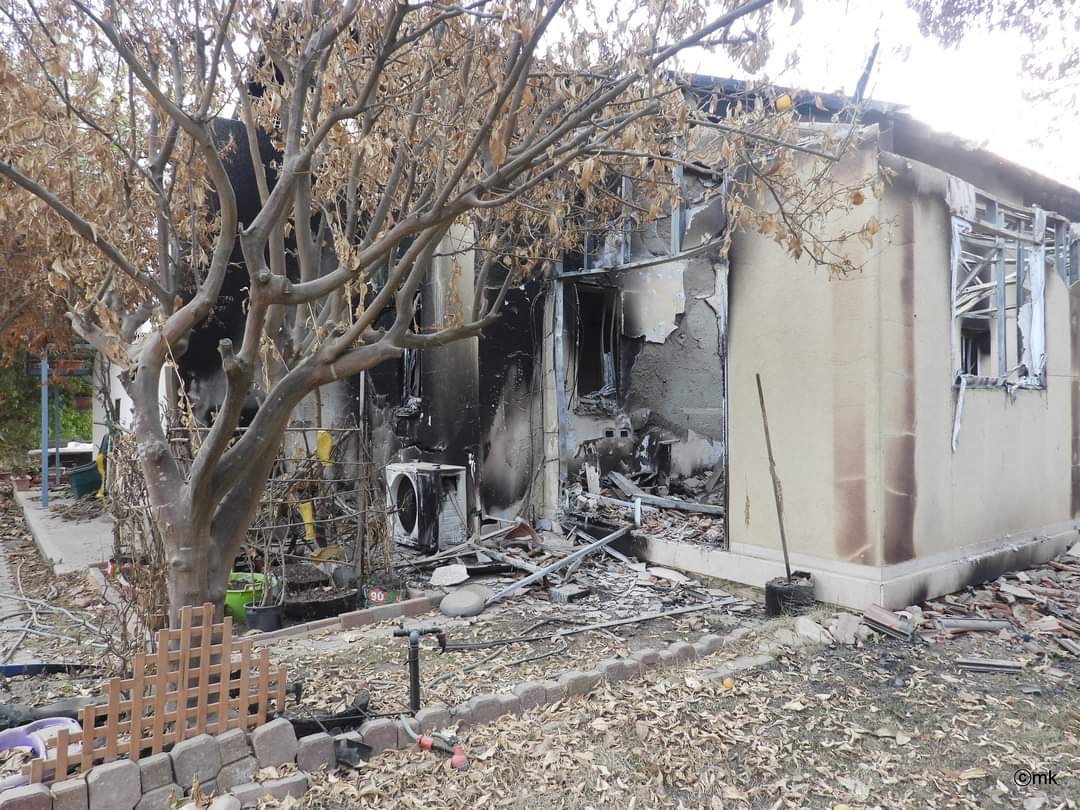
A photo of the house that Monica lived in after it had been burned down. Photo courtesy of Monica.
Epilogue
In the face of unspeakable tragedy, these Filipino caregivers chose to remain in Israel, steadfast in their commitment to provide care for their elderly charges.
Their dedication is profound, as they continue to serve their employers and support their families back home in the Philippines.
These overseas Filipino workers, often hailed as "Bagong Bayani" or new heroes, not just for their invaluable contributions to the Philippine economy through their remittances but also for their relentless courage as caregivers in Israel.
